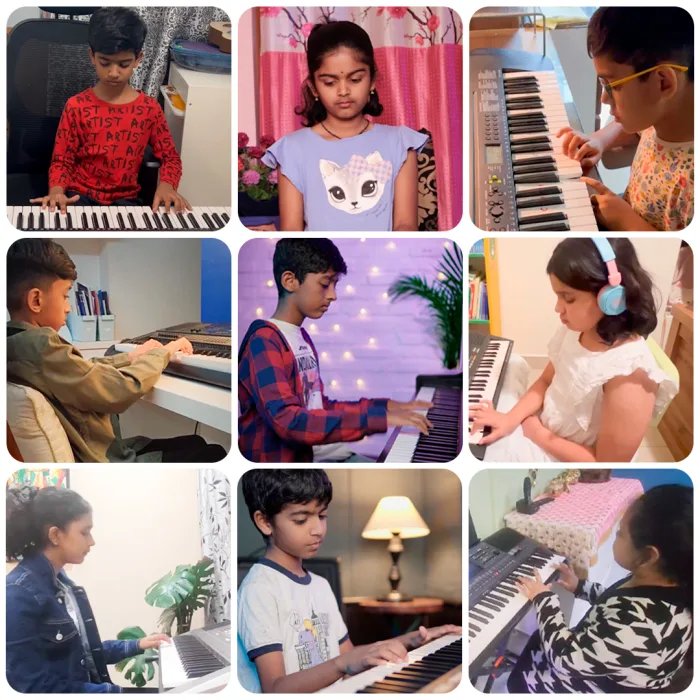About the Keyboard Level 8 Course:
This course is suitable for students who have been typically learning for five years or more and have now consolidated their playing to a high level. They have mastered the key skills up to Grade 7 and developed heightened technique, use of expressive devices, rhythmic complexity, fluency, coordination and musical understanding.
There will be an innate stylistic conviction and distinctive musicality with strong individuality. Communication will be commanding.
Prerequisites:
- Age 11 years and above.
- Instrument (Keyboard).
- Grade 7 Certificate (RSL/ Trinity/ LCM or any Equivalent Board ) or at least 5 years of formal keyboard/piano training/experience.
- Interest in music and learning keyboard.
Topics Covered:
- Technical
Scales – Students will prepare both natural minor and harmonic minor scales, major scales, minor scales, chromatic scales arpeggios that need to be played:
– hands together.
– ascending and descending.
– either straight or swung feel.
– cross four octaves (except half-whole and whole half diminished scales, which must be played over two octaves, and extended arpeggios which are one octave only).
Chords and Arpeggios – Chords and arpeggios played in Grade 8.
- D# dim7 arpeggio
- A7 arpeggio
- Eb7 arpeggio
- C13b9#11 arpeggio (1 octave)
Exercises: Fingering required to execute voice leading between two consecutive chord voicings.
- Musical Knowledge
Harmony
– Scales and modes which are being played.
Melody
– Intervallic construction of melodic phrases within the piece up to crotchet length.
Rhythm
– Whole, half, quarter, eighth, sixteenth, thirty-second notes, any dotted notes, triplets or any associated rests up to one minimum length.
- Sight Reading
- Key: Any key
- Time Signature: Any
- Rhythms: Whole, dotted half, half, dotted quarter, quarter, eighth, sixteenth notes, associated rests. Eighth, quarter, sixteenth note ties.
- Dynamics: Any
The sight reading test is in the form of a 16–24 bar example in any key. Students will first be given 90 seconds to practise, after which the examiner will play the backing track twice. The first time is for students to practise and the second time is for them to perform the final version for the exam. For each playthrough, the backing track will begin with a one bar count-in. The tempo is set to 60–200 bpm.
- Ear Training
– Melodic Recall
– Key: C major, C natural minor or C harmonic minor
– Tempo: 95 bpm
– Time Signature: 4/4
– Rhythms: Half, quarter, eighth notes.
The examiner will play a 2 bar diatonic melody in the key of either C major, C natural minor or C harmonic minor, with a range up to an octave.
There will be a C root note at the beginning of the test, then the melody will be played twice. After this, candidates need to play the melody back to a metronome click. Both playings of the melody and the metronome backing for the exam version will be preceded by a one bar count-in.
The first note of the melody will be either the root, third or fifth.
– Key: C major or C minor
– Tempo: 95 bpm
– Time Signature: 4/4
– Rhythms: Whole, half notes
The examiner will play a chord progression containing any combination of chords from either the C major or C minor scale, including seventh chords. Candidates will hear the test twice, then play the chords back to a metronome click. Both playings of the initial test and the metronome backing for the exam version will be preceded by a one bar count-in.
Workshops
- Keyboard and World Music: Explore different musical styles from around the world.
- Jazz improv workshop: Fundamentals of jazz improvisation and arrangements.
Learning Outcomes:
By the end of this course, students will:
- Perform with a sense of spontaneity, create and convey the mood to the audience.
- Perform with a confidence and a sense of authority and control that engages the audience wholeheartedly.
- Produce a secure and steady flow of sensitive personal information.
- Improve the level of notes reading and understanding.
- Enhanced listening skills.
- Grade 8 could be the final stage in the grade level. After grades students can continue with the diploma syllabus.
- Students who complete Grade 8 and acquired the skills will be eligible for International Board Exams like RSL,TCL and LCM.
What Students Get:
- Lesson Books for Keyboard Level 8 Course
- Live Instructor-led Classes
- 2 Performances and 2 Workshops
- Weekly Feedback and Regular PTMs
- Assessment and Certification
Class Options:
- 2 class per week for 45 mins (6 months) or
- 1 class per week for 60 mins (9 months)
Free Choice Pieces:
- Spain – Chick Corea
- Lingues – Snarky Puppy
- End Credits (E.T.) – John Williams
- Pinball Wizard – The WHO and Elton John
- Ready Wednesday – Snarky Puppy






Lopa Mahajan
Parent of Western Vocals and Keyboard student